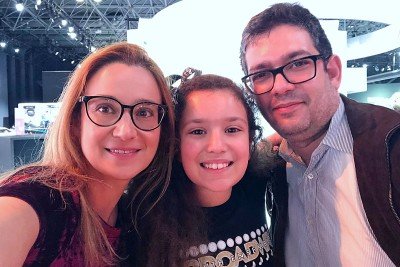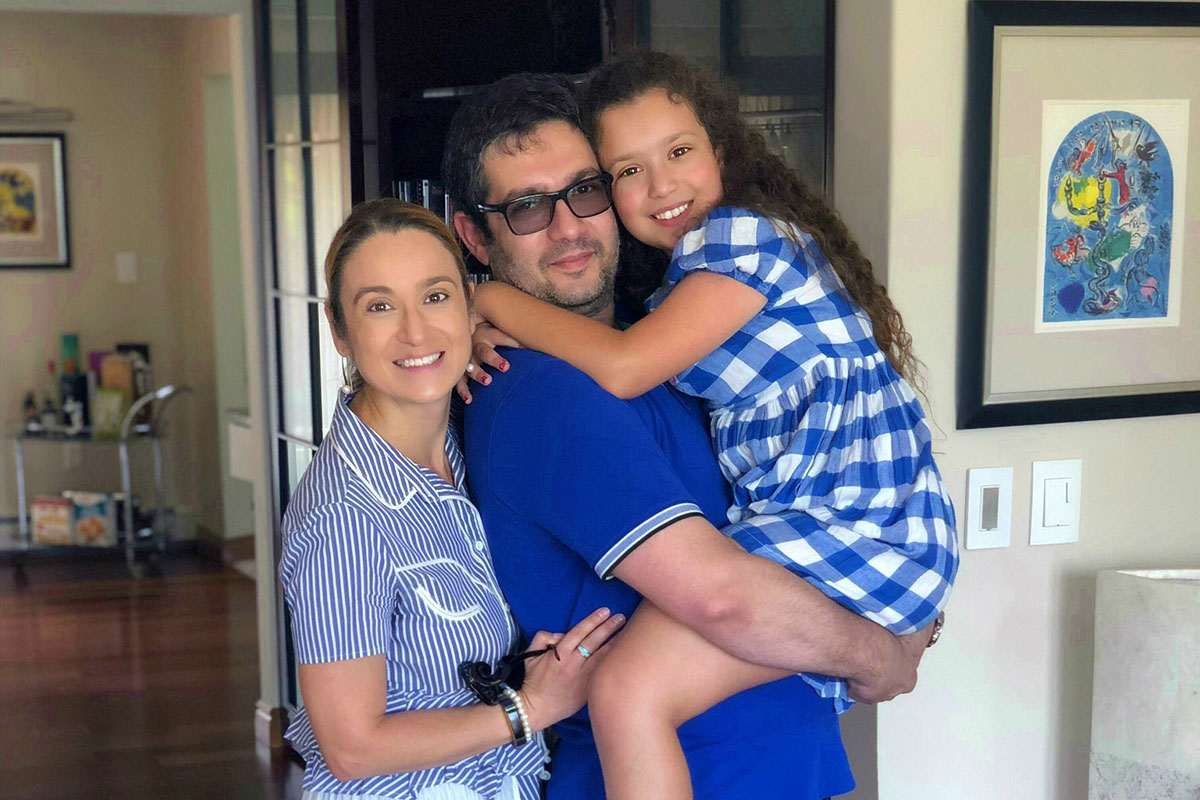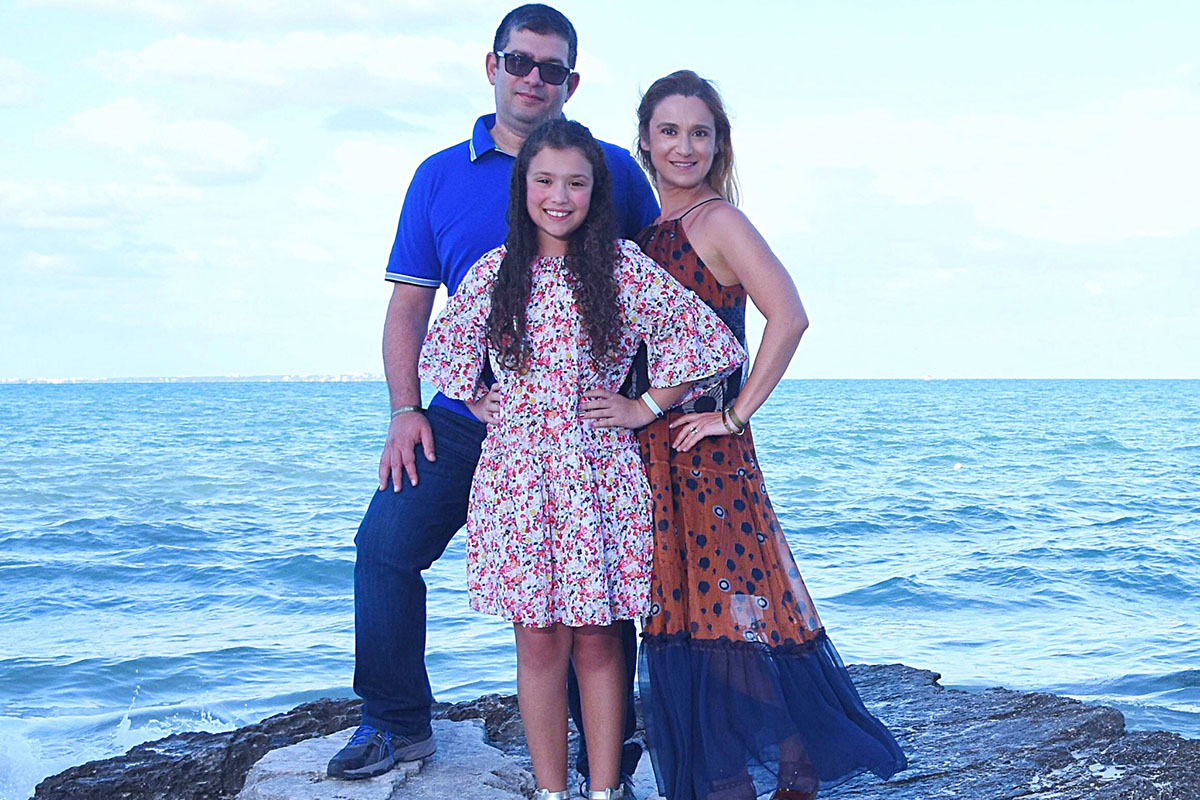Flourishing 11 Years after a Brain Tumor Diagnosis: Maria’s Story
Maria Rozentul had multiple seizures late in her pregnancy. Doctors discovered a brain tumor and wanted to operate right away, but Maria considered her options and came to Memorial Sloan Kettering for treatment. Read how she’s doing today.

In the spring of 2008, Maria Rozentul was in her early 30s and relishing the last months of her pregnancy. Then one day she suddenly began having seizures, one after another. Her husband, Lev, called an ambulance. The paramedics gave her medicine to stop the seizures and took her to a hospital near the Rozentuls’ home in New Jersey.
At the hospital, the doctors first delivered the Rozentuls’ baby to avoid complications from the seizure medicines. Ariela came into the world two months early and had to stay in the NICU, but the Rozentuls brought her home after three weeks.
Doctors then did a scan to see what had caused Maria’s seizures. They discovered that Maria had a brain tumor and wanted to operate immediately. But Maria was cautious and did not want to make a decision right away. She decided to think through her options.
“Our OB-GYN was really good and told us to find someone who specializes in brain tumors,” Maria says. “We met a couple of other doctors, but once we met Dr. Gutin, that’s the only person I knew I could trust with the surgery.”

At the time, Philip Gutin was Chair of the Department of Neurosurgery at Memorial Sloan Kettering. When Maria and Lev met Dr. Gutin, she asked an important question: Would she be able to postpone surgery for six months so that she could breastfeed her new baby?
“Ariela was so little and premature, and I wanted to spend six months making sure my child was well,” Maria says. “Dr. Gutin agreed and said that delaying the surgery six months was OK.”
Getting Answers
At MSK, Maria learned that the tumor was a diffuse astrocytoma. This tumor spreads throughout the brain and cannot be completely removed by surgery. It is a type of low-grade glioma, which is a slow-growing but serious cancer.
In December 2008, Maria had surgery at Memorial Hospital. Dr. Gutin and his team removed as much of the tumor as possible, and Maria dedicated herself to recovery.
“After surgery, the nurse told me that the more you walk, the faster you heal. I was out of the room as soon as she told me that,” she says.
Maria also had the tumor sequenced to determine if it had genetic changes. A mutation was found in the IDH1 gene, which would prove to be an important distinguishing factor for her treatment.
A Setback Brings Opportunity
About a year after surgery, the tumor began to regrow. Maria’s care team at MSK started her on chemotherapy. The medicine stopped the tumor from growing, and Maria tolerated the medicine well. The demands of new motherhood were keeping her busy.
Around this time, her neuro-oncologist left MSK and Maria’s care was transferred to Ingo Mellinghoff, Chief of MSK’s Brain Tumor Service. She knew right away that she was in good hands.
“Changing doctors was not easy, but Dr. Mellinghoff understood the transition and was very patient with me,” she says. “He was very nice and we got along really well. I completely respect his opinion and trust him.”
Dr. Mellinghoff, too, was eager to help Maria.
“I was struck by her amazing energy and her determination,” he recalls.
Unfortunately, 18 months after Maria finished chemotherapy, the tumor grew again. Dr. Mellinghoff suggested that she join a clinical trial that was evaluating a new type of medicine, vorasidenib, for tumors with IDH1 mutations like hers.
“The IDH1 mutation causes tumor cells to produce an abnormally high amount of a metabolite that drives tumor growth,” Dr. Mellinghoff says. “This drug is designed to block the production of that substance.”
Maria jumped at the opportunity.
“It was a pretty easy decision,” she says. “My tumor is not that common so there aren’t many treatment options, and all the other options were very aggressive. This was a less-aggressive option.”
It’s been three years since she started taking the medicine, which is just two pills a day. First, the medicine slowed the tumor’s growth. Then it stopped the tumor from growing at all. The clinical trial is still ongoing, but encouraging results have Dr. Mellinghoff feeling optimistic.
“Even with surgery, radiation, and chemotherapy, these tumors are not curable with current therapies,” he says. “There is an urgent need to develop new treatment approaches.”

Advice for Others
Maria comes in for blood work monthly and scans every two months, and she is otherwise in good health. She works part-time as a photographer and also manages Ariela’s budding acting career.
Having reflected on her cancer experience, Maria says that remaining positive has helped carry her forward through multiple rounds of treatment. She has stayed motivated with Lev by her side and Ariela keeping her focused.
“It’s very easy to start feeling depressed, but this situation isn’t your whole life,” she says. “It’s just something you’re dealing with. Find the things that keep you going.”
Craig B. Thompson, MSK President and CEO, is a founder of Agios Pharmaceuticals, which developed vorasidenib. Dr. Mellinghoff received research funding from Agios Pharmaceuticals.




